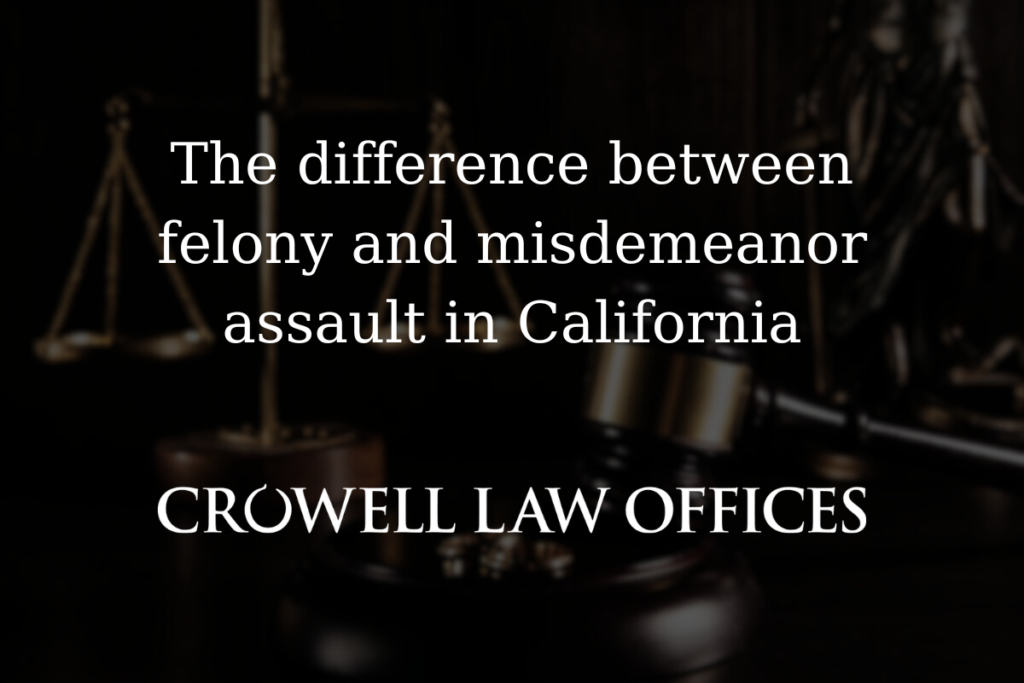Assault charges in California can result in serious consequences, but not all assault charges are treated equally under California criminal law. Depending on the facts of the case, assault may be charged as either a misdemeanor or a felony, each carrying vastly different penalties. Understanding the difference between felony and misdemeanor assault in California is critical for anyone facing these criminal charges.
In this article, we’ll break down the legal definitions, penalties, and defense strategies involved in both felony assault and misdemeanor assault under California law.

Legal Definition of Assault in California
Under California Penal Code Section 240, assault is defined as an unlawful attempt to commit a violent injury on another person when the defendant has the present ability to carry out that attempt. This means that even if no physical contact occurs, an attempt alone may lead to assault charges.
Assault differs from battery, which involves actual physical contact. Assault charges focus on the alleged attempt to produce great bodily injury or cause violent injury.
What Is Misdemeanor Assault in California?
Misdemeanor assault, often called simple assault, involves less serious offenses where no serious bodily injury or deadly weapon is involved. A misdemeanor assault charge may result from situations such as:
- Attempting to strike someone without making contact
- Threatening physical harm during a heated argument
- Minor altercations with no use of a weapon
Misdemeanor Penalties
The penalties for misdemeanor assault in California may include:
- Up to six months in county jail
- Fines up to $1,000
- Community service
- Probation
- A misdemeanor conviction on your criminal record
In some cases, a misdemeanor assault charge may be elevated to a felony if aggravating factors are present.
What Is Felony Assault in California?
Felony assault, also known as aggravated assault, is a more serious form of assault that involves factors like:
- Use of a deadly weapon
- Assault on a police officer or other protected individual
- Causing great bodily injury or serious bodily injury to the alleged victim
Felony assault charges in California include assault with a deadly weapon under Penal Code Section 245. This charge covers assaults committed with objects that can produce great bodily injury or death.
Felony Assault Charge Penalties
The penalties for a felony assault conviction can include:
- State prison sentences ranging from two to four years (or longer in severe cases)
- Fines up to $10,000
- Lengthy probation periods
- A felony conviction on your criminal record
- Severe penalties for repeat offenders or those with a criminal history
Felony assault is considered one of California’s violent crimes, and a conviction can result in long-term consequences that impact employment, housing, and civil rights.
Misdemeanor or a Felony? How Charges Are Determined
Assault charges in California can be charged as either a misdemeanor or a felony depending on several factors, including:
- Severity of the alleged assault
- Use of a deadly weapon
- Extent of bodily injury to the alleged victim
- The defendant’s criminal history
- The identity of the alleged victim (e.g., police officer, elderly person, or child)
- Circumstances surrounding the incident, such as domestic violence or drug offenses
The prosecution evaluates these factors when filing charges, and sometimes charges may be negotiated down from felony to misdemeanor through legal representation.
The Serious Consequences of Assault Charges
Whether charged with felony assault or misdemeanor assault, the consequences can be life-altering:
- Jail time in county jail or state prison
- A permanent criminal record
- Difficulty finding employment or housing
- Loss of professional licenses
- Immigration consequences for non-citizens
Because assault charges are considered violent crimes, the stakes are extremely high. Early intervention by a criminal defense attorney is crucial.
Defense Strategies for Assault Charges
Several defense strategies may be available in assault cases, including:
- Self defense or defense of others
- Mistaken identity
- Lack of present ability to carry out the assault
- False accusations by the alleged victim
- Absence of unlawful attempt or intent to cause bodily injury
A skilled criminal defense attorney will analyze the facts and build a strong defense tailored to the specifics of the criminal case.

How a Criminal Defense Attorney Can Help
Navigating California assault charges requires legal representation from a knowledgeable attorney experienced in both misdemeanor offenses and felony charges. A criminal defense attorney can:
- Negotiate with prosecutors to reduce charges
- Seek alternatives to jail time, such as community service or probation
- Challenge the prosecution’s evidence and raise reasonable doubt
- Present mitigating factors to reduce potential penalties
- Represent you in court throughout the legal process
Having experienced legal counsel may mean the difference between a felony conviction and a favorable outcome.
How Crowell Law Offices Can Help
At Crowell Law Offices, we have extensive experience defending clients facing assault charges in California. Whether you’re charged with misdemeanor assault or felony assault, we understand the serious consequences these charges can have on your future. Our team is committed to protecting your rights and fighting for the best possible outcome in your case.
Learn more about the difference between felony and misdemeanor assault in California. Call Crowell Law Offices at (916) 303-2800 to schedule your free, no-obligation consultation. You can also reach us anytime through our contact page. Let us help you take the first step toward justice and recovery.
Frequently Asked Questions (FAQs)
What is the main difference between felony and misdemeanor assault in California?
Felony assault usually involves aggravating factors such as the use of a deadly weapon or causing great bodily injury, while misdemeanor assault (simple assault) typically involves less severe threats or attempts without serious bodily harm.
Can an assault charge be reduced from a felony to a misdemeanor?
Yes. With effective legal representation, felony charges may sometimes be reduced to misdemeanor charges, especially if there are mitigating circumstances or weaknesses in the prosecution’s case.
What penalties do I face for misdemeanor assault?
Misdemeanor assault penalties include up to six months in county jail, fines, probation, community service, and a permanent criminal record.
How long is the prison sentence for felony assault?
Felony assault convictions can result in state prison sentences ranging from two to four years or more, depending on the severity of the crime and the defendant’s criminal history.
Do I need a criminal defense attorney if I’m charged with assault?
Absolutely. A criminal defense attorney can evaluate your case, negotiate with prosecutors, and present effective defense strategies to reduce or dismiss charges.
